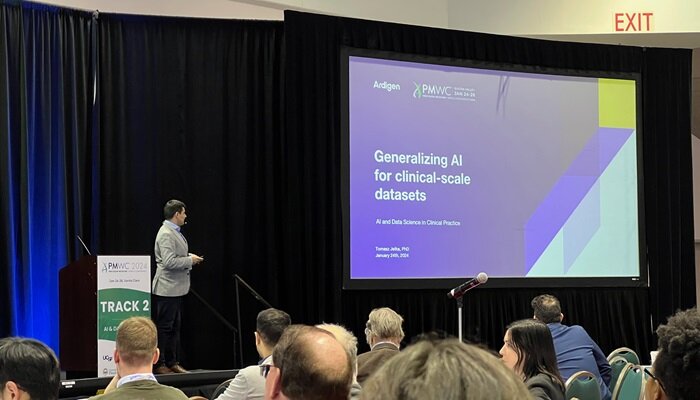Clinical data and processes hold untapped potential for reducing the burden and increasing the probability of success in drug discovery and development. For years, complexity, heterogeneity with unforeseen confounding factors, and legal restrictions have prevented the proper utilization of valuable insights hidden within layers of data. Meanwhile, the skyrocketing costs of pharmaceutical R&D are primarily driven by the inability to predict treatment outcomes in humans. Today, thanks to the recognition of high-quality data’s value together with the advent of artificial intelligence (AI) and machine learning (ML), this landscape is transforming.
Let’s explore some concrete use cases showing how scientists and physicians can better plan and execute clinical trials with the help of AI-assisted mining of medical records, imaging, omics, and other data types.
Diagnosis & prognosis
One valuable and already effective application is in medical imaging and patient screening. AI-powered computer vision efficiently analyzes data from histological samples, MRIs, X-rays, CT scans, and specialized medical devices. This capability not only helps clinicians make accurate diagnoses but also predicts prognostic outcomes based on subtle differences, which is —crucial for conditions like Alzheimer’s or heart disease.
In the field of omics, AI can similarly integrate diverse data streams—such as genomics, proteomics, and metabolomics—to identify biomarkers or mechanism of action (MOA) hypotheses that may indicate disease progression or treatment responses. By bringing together these various data types, AI enables a more comprehensive view of biological processes, leading to deeper insights.
The fast-evolving field of high-throughput proteomics from plasma or liquid biopsies is reshaping the landscape in terms of the level of detail in the insights we can extract from patient samples—ranging from neurodegenerative diseases to oncology. By combining large population datasets with flexible machine learning approaches, AI can identify patterns and relevant biomarkers across multiple diseases simultaneously.
Trial planning & design
Modeling and simulation techniques, such as model-informed drug development (MIDD) and quantitative systems pharmacology (QSP), can aid in decision-making regarding dosing and treatment regimens, while also providing insights into expected pharmacokinetics (PK), pharmacodynamics (PD), and specific mechanistic responses following the administration of a compound. With biology and chemistry data, researchers can simulate virtual patients. These approaches are already influencing Investigational New Drug (IND) applications, with the quality of evidence improving as the number of FDA submissions featuring a QSP component increases each year
Preliminary modeling and simulation of a drug’s expected outcomes in the target population can highlight the risks of failing to surpass the standard of care or competing therapies. With a data-rich, ML-enabled system, researchers can refine eligibility biomarker definitions to focus on patient subgroups most likely to benefit from the treatment, increasing the chances of the drug’s commercial success. Simultaneously, using machine learning to identify the most relevant parameters from available data improves trial-level data monitoring.
AI can also be used to assess the impact of inclusion and exclusion criteria on clinical trial outcomes. Over 80% of registered studies fail to complete recruitment within the target timeframe. Even the U.S. National Cancer Institute notes that eligibility criteria often do not align well with population characteristics and disease epidemiology. By utilizing large datasets of patient populations from historical trials and appropriate AI methodologies, you can simulate the impact of different enrollment criteria on recruitment probability.
Study execution
AI can also facilitate patient recruitment by leveraging available data on patient populations to identify centers with the highest likelihood of recruiting the required participants. While conceptually straightforward, this approach requires a significant paradigm shift in how trials are conducted. Fortunately, computational models can estimate the potential gains and costs, clearly demonstrating the ROI of such a strategy.
Although we have long used modeling to simulate patient responses, special attention is now being given to the concept of the digital twin. Essentially, this is a simulated control for a patient enrolled in a trial, where the simulation can involve alternative treatments, such as a placebo or standard of care. In principle, digital twins predict how a patient would respond in the trial if given the other treatment, based on baseline data and clinical records from that patient.
Through these methods, AI enables researchers to draw meaningful conclusions from small-cohort studies, potentially accelerating early-stage research and making clinical trials more efficient.
Next step: Personalizing treatments for targeted effect
Personalized medicine has long been an aspirational goal in healthcare. By tailoring treatment plans to individual patients, it promises to improve outcomes and minimize adverse effects. AI is bringing this vision closer to reality by integrating diverse data types—like genetic markers and lifestyle factors—into a comprehensive patient profile.
AI can identify biomarkers that signal disease risk or treatment response, enabling the discovery of precision therapies. For example, by analyzing genetic and metabolic data, AI can match patients with therapies that are most likely to be effective for their specific biological profiles. This approach not only enhances treatment efficacy but also supports clinicians in fine-tuning drug dosages to suit individual metabolic responses, reducing the risk of side effects.
The future: Integrating AI into clinical workflows
AI is no longer a futuristic concept; it’s a transformative tool reshaping clinical research today. With the ability to process massive datasets and integrate various data types, AI provides a more comprehensive view of patient health, facilitating a shift towards precision medicine.
To fully unlock this potential, organizations need cutting-edge tools and solutions. At Ardigen, we offer tailored AI services that accelerate every stage of drug discovery and development. From data analysis to clinical trial design, our expertise helps you harness the power of AI to bring new therapies to market faster. Reach out to us to learn how AI can transform your clinical research.




























